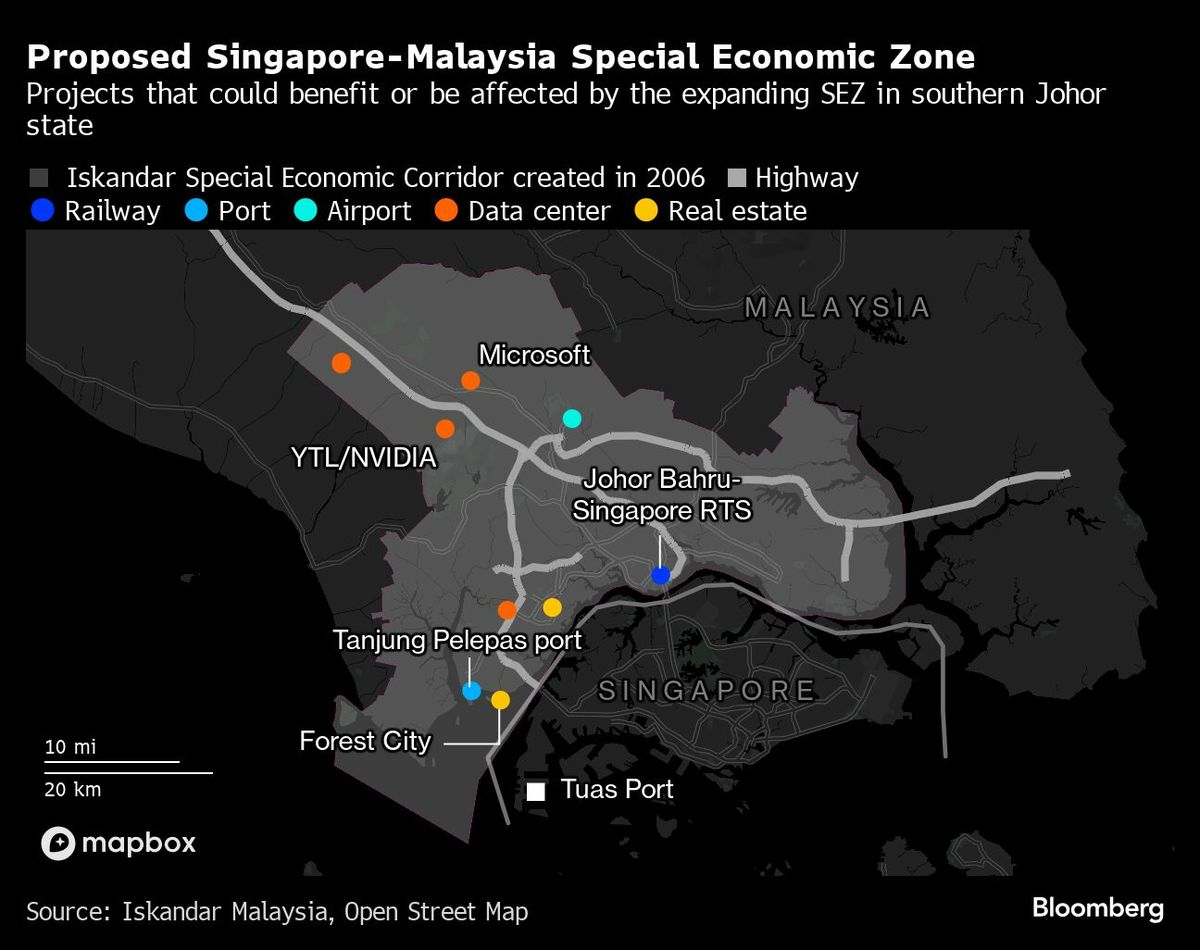
(Jan 7): The leaders of Malaysia and Singapore formalised an agreement establishing a special economic zone linking their two nations’ border region, with the aim of attracting 50 projects in the first five years of its establishment.
Malaysia Prime Minister Datuk Seri Anwar Ibrahim and Singapore Prime Minister Lawrence Wong officiated a ceremony on Tuesday for the economic zone in Malaysia’s southern state of Johor — which shares one of the world’s busiest border crossings with Singapore. The signing was postponed to January after Wong contracted Covid.
“It’s an important project which was built on the complementary structure of Singapore and Johor so that we can both be more competitive, enhance our value proposition and jointly attract more investments to our shores,” Wong said in Putrajaya, Malaysia’s administrative capital.
The two countries pledged to promote and facilitate 100 projects within the first 10 years. They’re counting on incentives including special corporate and income tax rates to lure in new investment.
Officials in Johor have previously said they expect the zone to create as many as 100,000 new jobs and add US$26 billion (RM117.22 billion) per year to the Malaysian economy by 2030. Much of that would likely come from new investment and Singapore-based firms expanding or shifting production to Johor, which has more land and a larger employment base to draw on than the city-state.
Elusive goal
Spanning over 3,500 square kilometres, the special economic zone is expected to be more than four times larger than Singapore and nearly twice the size of China’s Shenzhen — the city bordering Hong Kong whose success Malaysia is hoping to emulate with the SEZ.
“Very rarely do you find two countries working as a team,” Anwar said at the ceremony on Tuesday. “You can’t see it in any part of the world where two countries decide to work together, promote both countries, attract investments.”
Yet strengthening ties between Johor and Singapore has proven elusive in the past. Over 300,000 people cross the Johor-Singapore land border every day, most of them for work, and traffic on the two causeways linking the nations often cause hours-long delays.
A previous effort to knit the region together — including through a more than US$20 billion high-speed rail project — stalled because of disagreements over costs and other hurdles.
Economy Minister Rafizi Ramli told a briefing last week that the priority is to unwind the bottleneck in the movement of people and goods, and to ensure businesses can operate in Singapore and Johor.
Not everyone is convinced it will happen so soon.
“There are concerns regarding bureaucratic capacity and the management of expectations for businesses crossing the border into Johor,” said Asrul Hadi Abdullah Sani, a partner at strategic advisory firm ADA Southeast Asia ahead of the signing of the agreements.
Johor’s proximity to Singapore has long been one of its biggest assets. That was shown most recently by a boom in data centres in the Malaysian state, the result of Singapore’s moratorium on the construction of new data centres from 2019-2022, in part over concerns about energy supplies.
Still, the countries provided few fresh details beyond what was already outlined in a memorandum of understanding signed last year. That pact touched on clearly defined goals for facilitating the cross-border movement of people — which includes passport-free travel and QR-code-based clearance systems.
On its part, Malaysia has struggled to roll out a digital vehicle entry permit system and has only started trials for QR-code clearances at its checkpoints — programmes already implemented at scale by Singapore.
Some analysts said it’s unclear if both countries have made enough progress on streamlining investment and tax policies to truly catalyse fresh investment. Singapore has the region’s lowest corporate income tax rate at 17%, compared to 24% in Malaysia.
“The draw of the special economic zone is likely to be tax incentives,” said Yvonne Beh, a partner at Kuala Lumpur-based law firm Wong & Partners. “For companies looking to use Johor as a supply chain hub for the region, customs duties and sales tax exemptions would be the least that would be expected before they consider setting up a hub in Johor.”
To receive CEO Morning Brief please click here.
Read also:
KL-Singapore HSR can be revived with full private participation, says Anwar
Malaysia, Singapore reopen discussion on long-standing issues
Singapore PM stresses need for Asean countries to unite, supports Malaysia’s chairmanship
King grants audience to Singapore PM at Istana Negara
Anwar hosts dinner for Singapore PM
Uploaded by Chng Shear Lane

